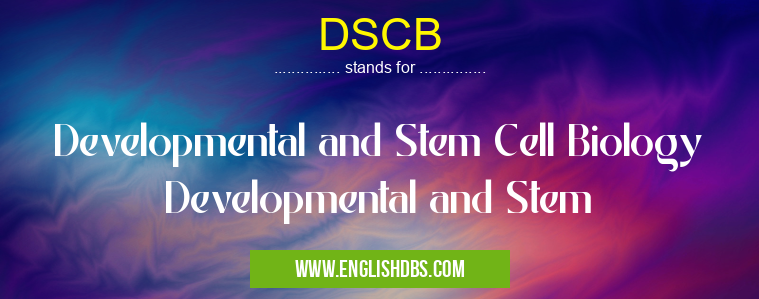What does DSCB mean in BIOLOGY
DSCB stands for Developmental and Stem Cell Biology, a scientific discipline focused on understanding the development of organisms from embryos to adulthood and the role of stem cells in this process.

DSCB meaning in Biology in Academic & Science
DSCB mostly used in an acronym Biology in Category Academic & Science that means Developmental and Stem Cell Biology Developmental and Stem
Shorthand: DSCB,
Full Form: Developmental and Stem Cell Biology Developmental and Stem
For more information of "Developmental and Stem Cell Biology Developmental and Stem", see the section below.
What is Developmental and Stem Cell Biology?
Developmental and Stem Cell Biology encompasses the study of:
- Embryonic development: The stages of development from fertilization to birth, involving cell division, differentiation, and the formation of organs and tissues.
- Stem cells: Undifferentiated cells with the potential to self-renew and differentiate into various cell types, playing a crucial role in development and tissue repair.
- Regeneration: The process by which damaged tissues or organs are restored or replaced using stem cells.
- Cell signaling: The molecular mechanisms by which cells communicate with each other, influencing development and stem cell behavior.
Applications of Developmental and Stem Cell Biology
- Medical research: Studying diseases related to developmental abnormalities and stem cell dysfunction.
- Regenerative medicine: Developing stem cell-based therapies for treating conditions such as heart failure, spinal cord injuries, and burns.
- Drug development: Understanding the role of developmental processes in drug efficacy and toxicity.
- Evolutionary biology: Investigating the genetic and developmental mechanisms underlying the diversity of life forms.
Essential Questions and Answers on Developmental and Stem Cell Biology Developmental and Stem in "SCIENCE»BIOLOGY"
What is Developmental and Stem Cell Biology (DSCB)?
DSCB is a field of biology that investigates the processes involved in the development of organisms from embryos to adults, including the role of stem cells in these processes.
What are stem cells?
Stem cells are unspecialized cells that have the ability to develop into various specialized cell types. They play a crucial role in the development and maintenance of tissues and organs.
What is the difference between embryonic stem cells and adult stem cells?
Embryonic stem cells are derived from early embryos and have the potential to develop into any cell type in the body, while adult stem cells are found in specific tissues and have a more limited range of differentiation potential.
What are the applications of DSCB?
DSCB has a wide range of applications in regenerative medicine, tissue engineering, and the development of new therapies for diseases such as cancer and neurodegenerative disorders.
What are some of the ethical considerations in DSCB research?
DSCB research raises ethical concerns regarding the use of human embryos and the potential misuse of stem cell technology for reproductive purposes. Researchers and policymakers must carefully consider these ethical implications.
What are the current advancements in DSCB?
Ongoing research in DSCB includes the development of new techniques for stem cell culture, differentiation, and tissue regeneration. Scientists are also exploring the role of stem cells in aging and disease progression.
Final Words: Developmental and Stem Cell Biology is a rapidly advancing field with significant implications for understanding human development, disease, and potential therapeutic interventions. By studying the intricate processes of embryogenesis, stem cell regulation, and tissue regeneration, researchers aim to unlock the secrets of life and improve human health.
